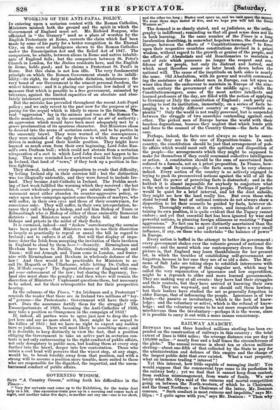GOVERNING WISDOM.
SAYS "A Country Groom," setting forth his difficulties in the 7Vmes- " Very few servants cant come up to the Exhibition, for the trains dont help us a bit. One excursion-train goes up in a morning and comes back at night, and another takes five days; so neether ant any use—one is too short, and the other too long ; Master cant spare us and we cant spare the money. We wont three days lasted of five, and we 'hope you will tell the Great Western so."
The demand is as clearly stated, and as judicious, as the ortho- graphy is indifferent; reminding us that all good sense does not lie in book learning. In the same number of the Times is a long lucubration describing, in somewhat hopeless terms, the disorder of Europe between the efforts of " Constitutionmongers " to force upon their respective countries constitutions devised in a priori wisdom, without regard to the growth or genius of the people, and the efforts of Absolutists and old Reactionaries to maintain a sort of rule which possesses no longer the respect and con- fidence of the people, but only its distrust and hatred, and which must therefore sooner or later break down before the national wilL The cause of the ineptitude on both sides is nearly the same. Old Absolutism, with its power and wealth command- ing the assistance of the ablest men in Europe, can hit upon no wiser idea than the endeavour to maintain in Europe of the nine- teenth century the government of the middle ages ; while the Constitationmongers' some of the most active intellects and learned professors of the day, are filled with the notion of applying to Germany or Italy the constitution of England; each party ex- pecting to rest its institution, immortally, on a series of facts be- longing to a totally different country or age. " Quantula sa- pientia " ! Only the world is not really governed, but is suspended between the struggle of two anarchies contending against each other. The picked men of Europe harass the world with their baseless dogmatisms, because they neglect that which lends pith and force to the counsel of the Country Groom—the facts of the case.
Perhaps, indeed, the facts are not always so easy to be ascer- tained as they are in the case of Exposition-trains. In each country, the constitution should be just that arrangement of pub- lic affairs which would most suit the aptitude and disposition of the people—the arrangements which they might be supposed to make for themselves if they could command collective intelligence or action. A constitution should be the sum of ascertained facts reduced to a formula, not an a priori proposition. In France, how- ever,—to speak by example,—the facts seem to be very obscure indeed. Every section of the country is so actively engaged in trying to push its preconceived notions against the will of all the rest, that its power of perceiving facts is distracted ; and in the hubbub it is almost impossible for anybody to conjecture what is the wish or inclination of the French peopIe. Perhaps if parties would be quiet for a brief interval, and let the dust subside, they might see how the land really lies. But even those who stand beyond the heat of national contests do not always show a disposition to let their councils be guided by facts, however ob- vious. Thoroughly rotten at its centre, and incapable of ascer- taining its own position, it is quite evident that the Papacy cannot endure ; and yet that essential fact has been ignored by wise and powerful nations, in planning foreign alliances or resisting " Papal aggressions." No fact can be more distinctly ascertained than the noxiousness of Despotism; and yet it seems to have a very small influence, if any, on those who undertake "the balance of power" in Europe.
Every nation is baffled in the attempt to better its government ; every government shakes over the volcanic ground of national dis- content ; and the moral which our contemporary draws from the picture is, that England may learn thankfulness for her present lot, in which the troubles of establishing self-government are forgotten, because in her case they are of so old a date. The Mor- mons of Salt Lake are taking steps to establish intercourse with the Pacific. The progress of that singular sect, which may be called the very organization of ignorance and low superstition, might be a reproach to older and more learned governments. They are making way at all events : they have had their struggles and their contests, but they have arrived at knowing their own minds. They are wayward, and we should call them lawless ; but their leaders have studied the art so generally forgotten in older Europe, that of influencing the people. Ignorance is of two kinds,—the passive or involuntary, which is the lack of know- ledge; and the voluntary or active, which is the refusal of know- ledge : and the voluntary seems to be not more respectable or less mischievous than the involuntary—perhaps it is the worse, since it is possible to carry it out with a more insane consistency.


























 Previous page
Previous page